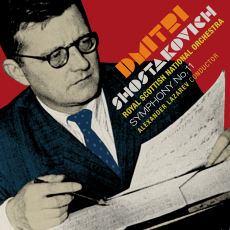Shostakovich Symphony No. 11 - Atlanta Audio Society
Symphony No. 11, Op. 103 by Dmitri Shostakovich, subtitled "The Year 1905," was arguably his last symphonic masterpiece. The Russian composer's Twelfth Symphony, written to commemorate the 1917 Revolution, is simply a bad piece of work. The Thirteenth is an uneven piece that gained undue celebrity from the composer's setting of Yevgeny Yevtushenko's poem "Babi Yar," a stirring lament for the Jewish victims of atrocity. We can only wonder what Shostakovich had in mind with his strange Fourteenth and Fifteenth Symphonies.But the Eleventh still holds up well, drawing its strength from the fact that it is an emotionally uncomplicated, straightforward work that tells its story with relative economy (at 60:33 in the present recording) and without ambiguity. It has been described, in fact, as "a film score without the film." It deals with the incident in 1905 that we have seen depicted in Doctor Zhivago and many lesser films in which peaceful demonstrators were fired upon by the Czar's guards and ridden down upon by mounted Cossacks. In the present SACD release from Linn Records, Russian conductor Alexander Lazarev leads the Royal Scottish National Orchestra in a beautifully paced account of the Eleventh Symphony. From the very beginning of the opening movement, "The Palace Square," with its quiet tympani triplets and glassy open fifths in the strings, we know we are in for a wonderful exercise in pictorialism in music. In the second movement, "The Ninth of January," Lazarev presents Shostakovich's contrast between the hymn-like melodies heard at the opening, based on the songs "O Thou, Our Tsar, Little Father" and "Bare your heads," both tokens of the people's respect for their ruler, and the eruption of orchestral violence that ironically marks the betrayal of that trust. The Third movement, "In Memoriam," is solemn and gloomy in its pathos, its potential longeurs forestalled by Lazarev's superb sense of timing. In the finale, "The Tocsin," Shostakovich works in a number of stirring Revolutionary songs to summon the listener to vigilance against tyranny. (You don't have to be a Russian to interpret this movement, but it surely helps to have a familiarity with the themes, as does Lazarev.) The work builds to a powerful climax "like a swarm of vengeful bees."

